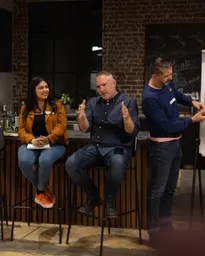I had a great time at the Aussie Founders Club
This article originally appeared on my substack here for subscribers.
It was such a great crowd at the Aussie Founders Club x EverestEngineering panel! Thanks for inviting me onto the panel Megan Luttrell!


As I promised at the meetup I here is the AI generated summary of the meetup from the recording:
What’s the first thing founders should know about AI?
- Ben: I realised that prompt engineering is key. We need to be very clear when instructing the AI because they are not yet able to understand what we mean without specific instructions.
- Sharbani: Even before figuring out how to execute with AI, take a step back and define the problem you are trying to solve. Once the problem is defined, you can define your AI objectives and what you want the AI to achieve.
With the rate of technology churn, how do you keep up?
- Amir: I've stopped counting, I’ve stopped looking at model sizes. They are all doing a good job until we get to AGI. Focus on the use cases and the impact.
- Ben: It’s weird, isn’t it, this feeling you need to check everyday what new model has been launched.
- Megan: I feel like I am already falling behind. Someone said the rate of change will soon be happening on a daily basis, it's hard to keep up with that.
Can you define AI?
- Ben: For most people, they’ve only heard about AI, but a small percentage of people have tried ChatGPT, which is a weak and cheap model. What I am talking about is the Larger Language models, which are a more powerful AI.
- Amir: AI is systems that can do human tasks. Within AI, there’s Machine Learning, systems that can take data, learn from it and perform tasks, and within Machine Learning there’s Deep Learning, which uses neural networks to mimic the human brain to an extent. Within Deep Learning you have Large Language Models, what we are talking about today.
What are the ethical implications of using AI?
- Sharbani: One main implication is bias, as AI looks at patterns and the most obvious behaviours to give you an answer. We should use AI to nudge us in the right direction, not to direct us. Bias creeps in all the time with AI so we have to be aware of that and avoid taking the most obvious path.
- Ben: Legally you are on the hook for what your AI does, so think about augment not automate. If you augment your staff, if it's wrong they can correct it. If you fully automate something, you are at a higher risk.
- Amir: Understand the basics, understand the jargon, limitations, how it works but not on a technical level. Understand the context of the problem and then see which of the customers pains and gains, this technology that you understand, can solve. Use the Ethics Canvas and ask yourself questions about explainability and bias, to make sure you can explain what the tool is doing to the customer and that your data is not biased.
What is the best thing you have done to save you time in your business?
- Ben: I uploaded a phone call to Gemini and I was able to convert it directly into a proposal in 20 minutes. It saved me four hours of work.
- Sharbani: I use AI to design workshops. I put together the format of the workshops using AI which saves me a lot of time.
- Amir: I haven't taken notes in meetings for six months, I use Fireflies which goes into all my meetings, listens, transcribes, creates action, sentiment and can send it to every other participant of the call.
The Prompt
Here is the prompt I used along with an image of the meetup page and the full audio.
Create a summary of the following audio, one section per question,
using the question as the heading, then one bullet point per speakers comment,
in the first person so it reads like a summarised transcript,
keeping only the most important content.
If you can identify the speakers do so.
Format in markdown.
Use British English spelling (e.g use spell the word as organise not organize).